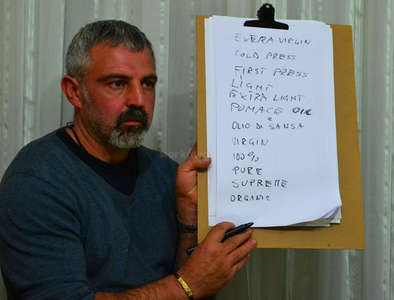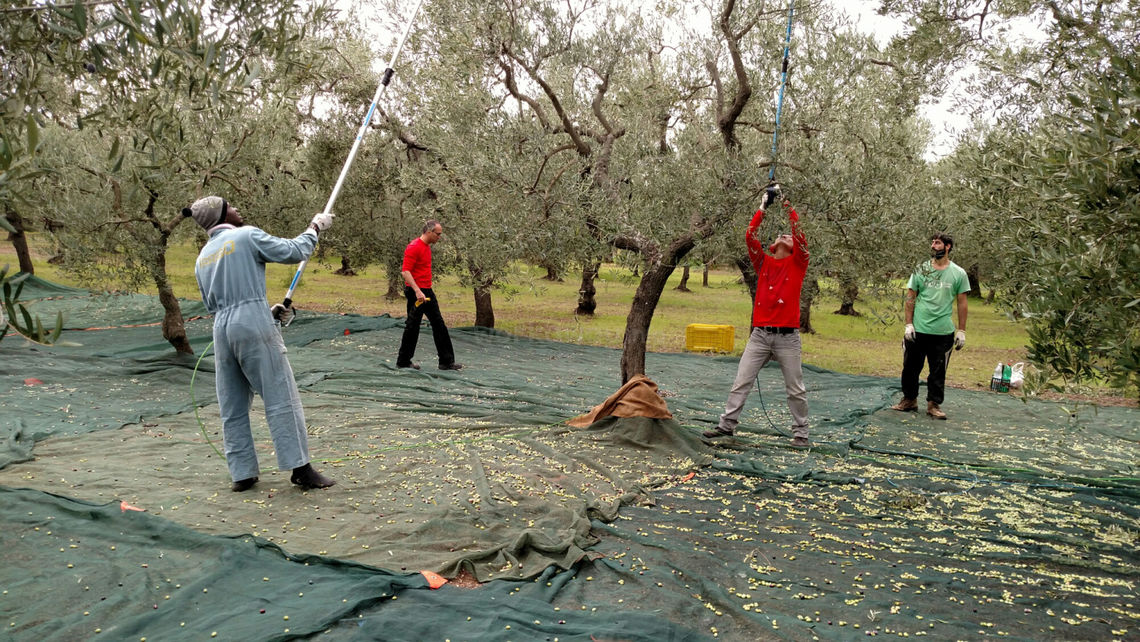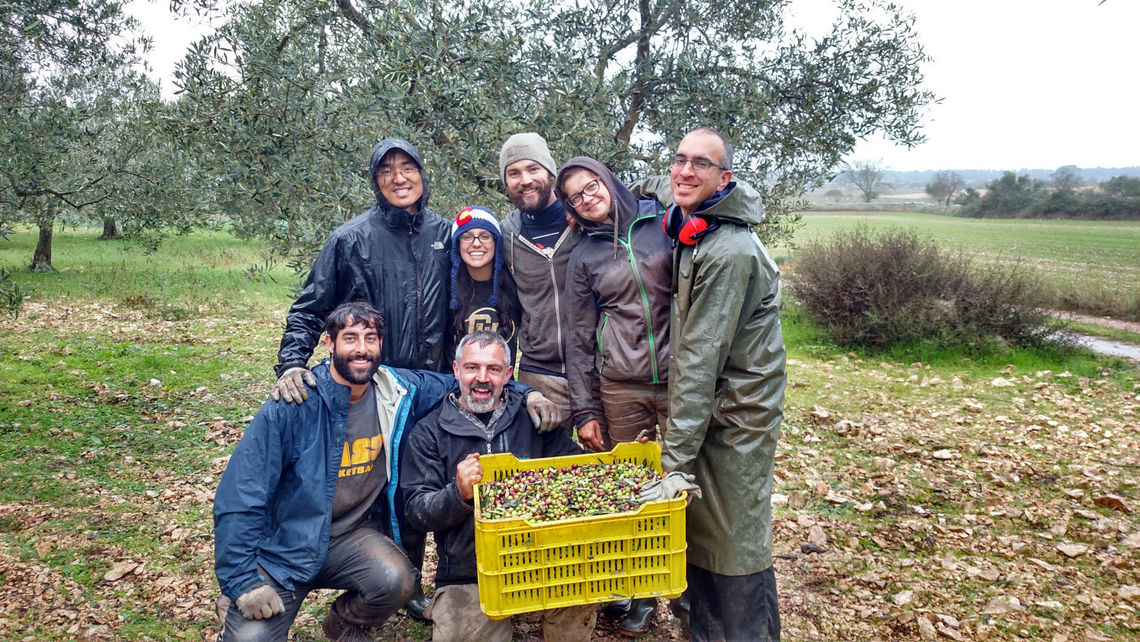Discovering Real Food and Olive Oil in Puglia with Workaway
Food will bring us together
It was the fifth day of the olive harvest. Maybe the sixth, or possibly the seventh. Honestly, those eleven straight days of intense harvesting have blurred together in my mind, so I’m not postive which day it was. We were sitting down for lunch, using empty yellow olive crates as seats and eating leftover pasta from the night before with two fresh loaves of Altamuran bread with an olive-garlic-tomato snack whilst drenching everything in last year’s vintage of the family olive oil. I was amazed we even had food leftover from the night before as the hard work combined with great food had stoked everybody’s appetite. I passed my glass to Matteo for a refill on my wine, presumably a Primitivo, made by one of Tonio’s neighbors.
Tonio, our host, and the reason this team of seven volunteers and travelers from around the world had come together in Altamura, Italy to harvest olives, looked at the perfectly lined olive trees and then back at our circle.

“I wish I could get all of the world leaders together. Get them out of their offices, out of the cities, and have them get together and put in an honest day’s work on the harvest. Could you imagine? Putin and Obama working side by side, forced to put aside their differences for the sake of getting the task done. And at the end of the day, they could come together at the dinner table. I think it would solve a lot of the world’s problems.”
We all nodded our agreements. We were still digesting our lunch were a little too tired for an in-depth conversation on food politics and what ails the world, but we knew the statement to be true. We were perfect examples of the amazing ability that food has to bring people together. Together, as a group, we represented seven different nationalities from four different continents. Despite nobody knowing each other before our arrival (other than Chynna and I), we had quickly become a group of friends in five days. Or was it six days?
Staying in Altamura in the heel of the boot of Italy
We spent a total of three weeks in Altamura with the Creanza Family. Altumara, a city with history spanning thousands of year, sits at the top of Puglia, the heel of the boot in Italy, in the Bari region. It is known as the “Citta Del Pane” (“City of Bread”) as it homes over a hundred bakeries that make their own version of the famous Altamuran bread, the Pane di Altamura. Made from all whole grains and durum wheat and Alturma’s unique limestone-mineral water, the bread will ruin you for years after as nothing else with quite compare to its texture and taste, and nothing can compare to a rustic bread baked in a 300 year old oven, as they are at Antica Fornus Santa Clara. If you go, time your visit for some fresh foccacia straight from the oven. Your tastebuds will thank me later.
Besides bakeries, the small Italian city is scattered with formaggio (cheese) shops, cafes with one-Euro espressos, gelato, and is steeped in history, with frescoes and city walls that depict centuries of stories and generations of families.
All of these incredible products are made possible by the local Altamuran farmers, and that’s where the Creanza family comes in. They have been harvesting olives in Puglia for generations to make some incredible, authentic, and 100 percent real Italian olive oil.

I’m willing to bet that many of you have never actually tasted real olive oil. That might seem like a bold statement, especially for some of you food inclined people. Maybe you think that because you shop at Whole Foods, or because you pay a little extra for the bottle that says “100 percent” with a big Italian flag on it, or that because you know all the health benefits of extra virgin olive oil, that you most certainly use real olive oil everytime you dress your kale salad.
It turns out that nearly 70 percent of Italian olive oil sold in the United States is fraudulent. That’s according to Tom Mueller, author of Extra Virginity: The Sublime and Scandalous World of Olive Oil, whose book helped crack open the secrets of fake Italian olive oil. The entire industry, especially at the international export level, is riddled with lies and mislabeling. Mueller speculates that nearly 80 percent of Bertolli’s olives come from Spain, the Middle East, and North Africa. Or, to put it another way, Italy current exports three times more olive oil than it produces.
And who was one of the men that Mueller met with to discuss real olive oil? Who helped Mueller develop a taste for real olive oil? Who sat with Mueller and shared dinner with him and now owns a signed copy of his book? That would be none other than our host, Tonio Creanza. If you ask Tonio, oil fradulence might be even worse than what Mueller speculates. Tonio mentioned to us that it is essentially impossible to buy actual Italian olive oil at a supermaket in the United States, and that if you ever pay under $10 for a bottle you might as well forget about it – it’s definitely not all olives in that bottle.
Harvesting olives and learning about food culture over lunch
Which brings us back to the olive orchards. It’s a warm November day – during an uncharacteristically dry and warm spell – and I’ve started filling everyone’s espresso cups with cold, sweet coffee to get us a little boost after our big lunch. We still have another day in this field before we move to the big field on the hill. I don’t know what that means yet, but Tonio and Matteo, a veteran volunteer on his second harvest, can’t help but show in their countenance that we’re in for a challenge.

Tonio leading us on a tasting of real olive oil and walking us through what these words actually mean
The conversations have jumped back and forth from politics to debates on food culture and cultural differences on hospitality, something I’m inclined to chime in on as a bartender and server in the States. We all enjoy our much deserved lunch before slowly cleaning everything up and getting back to the harvest.
Harvesting olives without tractors or big machines is hard work, and there is really no way around that. In the olden days, I’m talking pre-Republic Roman Empire here, field hands would use a large stick to hit the trees and force the olives to fall, which they would then collect in large clay pots. We’ve advanced a little since then, but our crew is still doing everything essentially by hand. A team of four works to set down nine large green nets on the ground around the trees. Another team of three uses three compressor powered rakes of various lengths that shake the branches free of their olives, which fall onto the mats. When they finish with a section, the net team folds the olives into the middle, picks out some of the large branches and leaves, and dumps them into a crate, before leapfrogging the net to the next section of trees.
After a few days our team had gotten a solid routine. The rakers rarely had to wait for the net crew and we never stopped moving, but we were definitely slowing down from our pace on the first few days. The concept is straightforward enough, but by this point my shoulders and arms were bruised from carrying the filled crates back to the van, Chynna’s thumbs had essentially stopped opening from grabbing the heavy mats so often, and the rake team could barely hold the rakes above their heads anymore.

Cultural exchange through Workaway
We were tired, there was no doubt about that. Yet there was Tonio, older than all of us, able to work harder and faster than us, constantly moving and counting olives and calculating them into litres of oil. Tonio actually lives in Toronto, Canada these days, but returns to Puglia for the harvest and to direct the Messors Program, along with Francesco Creanza (they’re actually not related, despite the last name. Creanza is apparently a pretty common last name in Puglia). Tonio organizes a team of volunteers through Workaway. Workaway is a site that gives travelers an opportunity to exchange volunteer time for room and board around the world. In this case, we were staying with the Creanza family in their four-story apartment in downtown Altamura and enjoying the best food we’ve ever had in our life.
There’s good food, and then there’s Nona’s and Rosanna’s homecooking, which exists on another tier. I’m not positive what they ate at the Last Supper, but if I had the choice, I know who would have catered the event. I’ve never ate better in my life, and no matter how hard I try I don’t think I’ll ever be able to. Despite the long hard days of work, we all managed to gain weight from all the delicous food, which seemed to be in endless supply. Every meal was three courses – salad, pasta, and main. Then there was the wine, and the dessert, and the mixed nuts and fresh fruits. And if that wasn’t enough, there was homemade lemoncello.
Not all of the food was incredibly complicated. In fact, the best meal that we’ve ever had in our life was a simple linguini pasta dish with fresh tomatoes, sauteed greens, and our first pressing of our hard earned olive oil. But all of the food was amazing and it was real. When we had burrata it was made fresh, that morning, and served with great bread, our olive oil, prosciutto, and sliced Roma tomatoes with sauteed peppers. It was amazingly simple, yet also a meal that most of us couldn’t help but take a picture of, to record for future nostalgia.

All of the great food revolved around one thing – Creanza Family olive oil. We cooked with it, we drenched our bread in it, covered the burrata with it, and we had a bottle with us everywhere we went. We must have gone through an entire bottle in just a few days. The olive oil, in its taste, its color, its smell, and even the way it feels in the mouth is different from any oil you’ve purchased at the supermarket.
The great olive oil scandal!
The vast majority of Italian olive oil, if it is actually made with Italian olives, is cut with seed oil (either rapeseed or canola) to lower the price. Real Italian olive oil is fragrant, a perfume of grass and citrus notes combined with the unexplainable smell of an actual olive press. We had the pleasure of following Tonio to the press, where we dumped our crates of purple and bright green olives into a larger crate to be crushed, seperated, filtered, and pressed into a bright green liquid at the other end. Immediately upon entering the press an intoxicating smell consumes you – and that is what real olive oil should smell like.
As Tonio led us on a tasting of the oil, he explained some of the nuances of real oil versus fake oil and how one can tell the difference. First clues that the oil is fake is if it comes in a plastic bottle, is close to yellow in color, and whether or not it has an expiration date on it. Check your cupboard. Do you still think you’ve had the real stuff?
Tonio points out to everyone that he sells his oil to that there is a lot of mislabeling in the olive oil industry. For it to be called “100% Italian” olive oil, the product simply has to be bottled in Italy – allowing producers to purchase olives from other countries (namely Spain and North Africa) and bottle it in Italy. It doesn’t even have to olive oil. It can be 80% seed oil with just a bit of olives and it still earns the label.
“Cold-pressed” is the process of pressing the olives without applying heat – which essentially every press practices, making the label meaningless. Then there’s “Extra Virgin,” the creme de la creme for most people when it comes to olive oil. While many people assume that extra virgin means untainted, pure olive oil, the label actually refers to the level of acidity in the final product – 1% for the “extra” label, and between 2-3% for the virgin label. While extra virgin olive oils do tend to be a higher quality product compared to cheap oils from other countries, the vast majority of Italian oil earns the label, so it does not promise the consumer that it is a real product.
All of this might seem a little extreme, but you have to consisder the fact that most of the Italian olive oil industry is ran by the Mafia. No, I’m not kidding. 60 Minutes recently ran an expose on the mafia’s involvement in the fake food industry. In the program, they detail how easy it is to manipulate cheap seed oils into smelling and looking like the real stuff. However, a trained palette can quickly tell the difference.
Before we got our very own bottle of olive oil from the harvest, Tonio lead us on a tasting course of olive oil. We treated the product like a fine wine – we coated our mouth and tongue, we swirled and breathed in. Tonio talked about the entire process of making oil and what to look for when tasting. Real olive oil smells exactly like the olive press we visited – it is grassy and the olive smell is intense. There is a slight citrus note to it, and as you drink it the antioxidants burn the back of your throat, taking your breath away and forcing a few of us to cough. Compared to the cheap stuff, a product that still says “100% Italian Extra Virgin Olive Oil” on the bottle, it was completely different. The cheap stuff was pale in color (compared to the beautiful green that our oil was), it barely smelt of olives, and there was certainly no burn from the antioxidants. On the finish, our olive oil was crisp and clean, while the seed oil coated and lingered with a slimy, oily feeling in your mouth.
Real food takes hard work. That is something that we as a society are going to have to accept if we want to enjoy the best foods that the world has to offer. It does not have to be expensive, as the cheap price of foodstuff in Italy proves. But it does take a lot of hard work from communities to grow, harvest, and produce real food without cutting corners. Things like pesticides and cutting products to lower the costs robs us as consumers of the joy of real, healthy food, while also taking away from the hard work and commitment that those who produce quality ingredients actually put in.

Our three weeks in Italy gave us the opportunity to explore the nuances of the current state of food in the world. We discussed everything from small-scale farming in Rwanda to globalization to slow food and just about everything in between. We railed about how ridiculous it is that we pay extra for things that are “local” and then on the other hand pay more for products because they are “imported.” We talked about everything from the truck drivers who deliver the food to the future of robots in food production. We left the discussion more confused than when we began, but passionate to spread the converstaion to dinner tables around the world.
In many ways, the Italian olive oil industry is a microcosm of so many of the world’s ailments. We’ve substituted a quality day of work for lowering costs and exchanged health and taste for economic benefit. Yet, within the industry seems to lie the answer to many of the world’s problems. More of us need to commit ourselves to consuming real, quality products, and reaping the benfits of not only the final product but of the work that goes into making them. As we learned as a group of international volunteers, hard work and great food can bring the world together in ways that many other things cannot.
At the end of all that hard work, though, is a table full of hungry, happy people enjoying some of the best food of their lives. It took us eleven straight days of hard work to finish the harvest, but we all left Altamura with a commitment to something bigger than ourselves and a commitment to authenticity. Even more than that, despite starting as strangers from foreign lands, we left the harvest as a group of friends who had shared an amazing experience with each other.
Maybe we should get our world leaders together for next year’s harvest.
-Ryan and Chynna
Thanks and Credits!
Thanks to Ryan and Chynna for letting us repost their great article about harvesting olives.
You can read more about their experiences over at their blog.
How Two Young Americans Afforded 9 Months of Travel with Workaway : Two twenty-somethings from the United States, a barista and a bartender, get on an international flight. They have one-way tickets to Europe and no return date in mind except for a vague notion of “when the money runs out.”
About Contributor
We are so glad to have an active community of travellers and hosts who’ve been inspired by their Workaway experiences and want to share with us! Be it a funny story, interesting insights or helpful ti